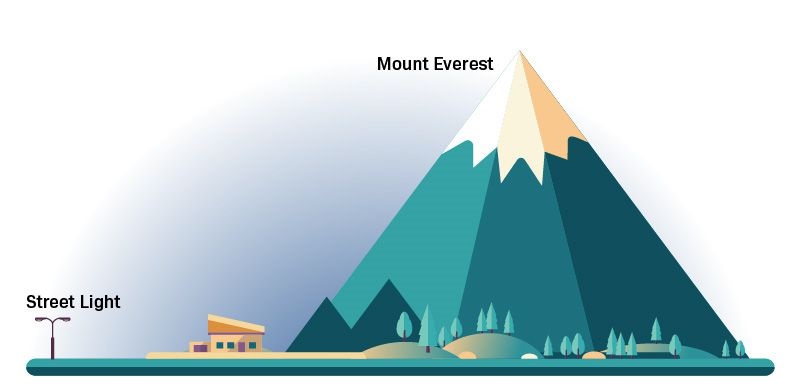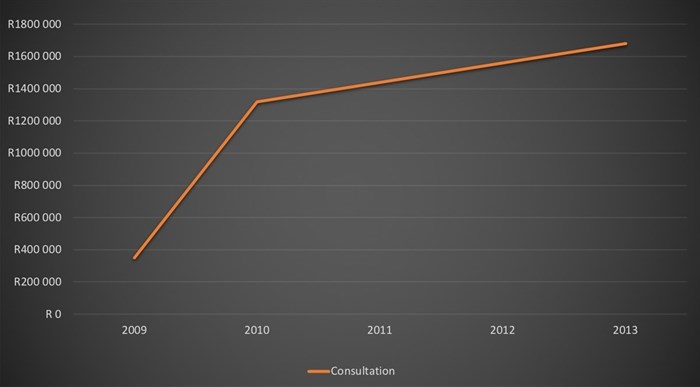The Challenge
The need for Elint came about when a large business became subject to an additional expense of R100m for being non-compliant with SHEQ (Safety, Health and Environment and Quality) standards.
As a business, Elint stems from SHEQ Consultants, group of consultancy specialists, who were approached by this heavily penalised company to get their compliance in order. In reviewing the compliance case, one thing became abundantly clear. The extra cost to the offending company, that would’ve ensured they were compliant and avoided the non-compliance penalty fees, was only R160,000. Compared to the R100m penalty they incurred this is literally the same as comparing the height of a street light, to the height of Mount Everest!
R160,000: R100,000,000 — the same ratio as the height of a street light to the height of Mt. Everest.

The process
SHEQ Consultants saw an opportunity to ramp up their offerings as compliance consultants and got to work to ensure this stumbling business never had compliancy issues again. So began a journey to find the most cost-effective, results-driven approach to handling the compliance of a large, international corporation’s compliancy crisis.
From 2009 SHEQ Consultants launched a program of consultancy sessions (orange line in the graph below). These were extremely time-consuming since a lot of manual work had to be done. They also involved a lot of follow-up at a ground level to ensure the correct data points were being accurately captured. At the high expense, for several years, they continued this manual consultancy plan with their clients.
Progress was being made but since so much of the process involved manual procedures the information captured was continually becoming out-dated. This meant the billable hours for consultation to the company remained high in an effort to keep things on track. It also meant a heavy workload for SHEQ Consultants to constantly oversee.

In 2013 however, the consultancy group decided automation was a clear way forward and began investigating various off-the-shelf risk and compliance software available. They recommended software but the decision remained with the client.
The chosen off-the-shelf software proved a huge extra expense to the client and only marginally decreased the need for constant expensive consultation (yellow line in the graph below). The software also simply didn’t have the integration with existing systems needed. More and more costly developer work seemed to be demanded to make a square peg fit in a round hole.

“We used a system that was a complete nightmare - for two years. We simply couldn’t integrate the existing management system into it. The software was built for only one discipline: environmental. It wasn’t suitable for health and safety. The new CEO reviewed the software with us and found it was not working.” says Roeleen Henning, director at Elint.
Every major off-the-shelf software package available was explored in an effort to resolve the situation but it became clear that none would truly add the value to the group’s consultancy offering that their own high standards demanded.
From this hard-learned lesson, the client conceded to SHEQ Consultant’s advice and decided to explore a custom-developed software solution. 'SHEQ consultants' became 'Elint' and the new software of the same name was given a chance to prove it’s worth.
“We knew what we wanted to do and that we had to develop our own system.”
We looked at different systems and there was always something missing, nothing achieved the goal of replacing the consultant. A lot of the packages help the consultant by providing an extra service by giving a bit of software that enhances their offerings. We needed something that would replace the consultant entirely, without bells and whistles. We offer the bare minimum to be compliant. We aren’t interested in having the client buy services they really don’t need. Other systems sell an idea that isn’t actually necessary and isn’t even asked for by the ISO standards.” adds Henning.
The consultancy group, now thoroughly disappointed with the current risk and compliance tech offerings available in the software market began to look at other options. They started development with a one-man show and realised he simply couldn’t keep up with the demand.
“We don’t have someone in house, it’s not our area of specialisation. We recognize the value of outsourcing to other businesses and making use of their area of specialisation.” according to Henning.
They then looked at various developer houses, even employing a specialist to help them make the smartest choice on which development house to partner with.
“There were a lot of promises made by the other houses, they weren’t always open and truthful. If you don’t understand the field, developer people can tell you a lot of nonsense and you won’t even know it.” notes Henning.
Finally, as advised by their own independent software development consultant, they selected Co-foundry to manage the development process and take the consultancy group, now known as Elint, to where it is today.
Co-foundry took the initial application from a level of operation that was overloaded and struggling at its current capacity, to a robust system that can effortlessly handle over a hundred times the current system’s demands.
Elint finally became able to achieve their initial goals of more efficient and cost-effective compliance management. As their custom-developed software features came more and more online (represented by the green line below) billable consultant hours rapidly decreased because the application began to take the load.

Elint’s clients love using the new system. They get what they want, are now able to actually improve the areas of compliance management they want to and love the continual improvement of the system by the Co-foundry/Elint partnership. On a site level it’s a case of only needing 1 person instead of 5, music to any business’s ears.
“Not a single person we’ve demonstrated to doesn’t want to use it. No consultant has ever seen a full system like this that can do everything” states Henning.
Co-foundry continues to work in close partnership with Elint and is continually releasing improved functionality and entirely new features under Elint’s guidance and strategic planning.
“Co-foundry work according to a system. I’m a tick-box system kind of person and they manage with a tick-box system. Even if I push them, if it’s not possible, they’ll say they can’t do it. And it’s a straight answer. For the very first time in the history of Elint, the timelines are the ones you get promised. Also, with Co-foundry’s approach, you don’t have to wait for your product to be finalized. You can deploy bit by bit at a time which makes it easier to implement. The solution is already 90% catered for and the software becomes more and more valuable over time as it’s further perfected.” concludes Henning.
The article was first published on www.co-foundry.co.za